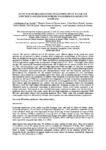Use este identificador para citar ou linkar para este item:
http://www.alice.cnptia.embrapa.br/alice/handle/doc/577761| Título: | Effect of increasing doses of glyphosate on water use efficiency and photosynthesis in glyphosate-resistant soybeans. |
| Autoria: | ZOBIOLE, L. H. S.  OLIVEIRA JUNIOR, R. S. de   BONATO, C. M.   MUNIZ, A. S.   CASTRO, C. de   OLIVEIRA, F. A. de   CONSTANTIN, J.   OLIVEIRA JUNIOR, A. de   |
| Afiliação: | LUIZ HENRIQUE SAES ZOBIOLE, UEM; RUBEM SILVÉRIO DE OLIVEIRA JUNIOR, UEM; CARLOS MOACIR BONATO, UEM; ANTONIO SARAIVA MUNIZ, UEM; CESAR DE CASTRO, CNPSo; FABIO ALVARES DE OLIVEIRA, CNPSo; JAMIL CONSTANTIN, UEM; ADILSON DE OLIVEIRA JUNIOR, CNPSo. |
| Ano de publicação: | 2009 |
| Referência: | In: WORLD SOYBEAN RESEARCH CONFERENCE, 8., 2009, Beijing. Developing a global soy blueprint for a safe secure and sustainable supply: proceedings. Beijing: Chinese Academy of Agricultural Sciences: Institute of Crop Science, 2009. Poster. WSRC 2009. 1 CD-ROM. Editado por Lijuan Qiu, Rongxia Guan, Jian Jin, Qijan Song, Shuntang Guo, Wenbin Li, Yuanchao Wang, Tianfu Han, Xiaobing Liu, Deyue Yu, Lianzhou Jiang, Deliang Peng. |
| Conteúdo: | The increase cultivated area of GR soybeans across different regions of the world have raised questions not yet answered as related secondary effects of glyphosate on physiology of GR soybeans. In this work, we attempted to measure the effect of increasing glyphosate doses on water absorption and photosynthetic parameters of soybean, cv. BRS 242 GR. Plants were grown in completed nutrient solution (Hoagland & Arnon, 1950) in a greenhouse equipped with an evaporative cooling system (25?35 : 20?22C day/night) under natural daylight. The commercially formulated isopropylamine salts of glyphosate was sprayed on foliar doses of 450, 675, 900, 1350 and 1800 g. e.a ha-1 either in single application at four leaf stage (24 DAE) and in sequential application (24 and 36 DAE) (50%-50%) at four and five leaf stages, respectively. Using an infrared gas analyzer (IRGA), fluorometer (pulse-modulated) and chlorophylometer, before and after herbicide application net photosynthesis (A), transpiration rate (E), stomatal conductance (gs), sub-stomatal CO2 (Ci), carboxilation efficiency (A/Ci), fluorescence (Fs), maximal fluorescence (Fms); yield of quantum efficiency (Y=Fm-Fs/Fms) and chlorophyll contents were monitored. In addition, water absorption was measured daily and biomass yield and water use efficiency (WUE) were estimated by harvesting plants at R1 stage. All measures of photosynthetic parameters (A, E, gs, Ci) and Fs, Fms and Y were affected by increasing glyphosate doses. Chlorophyll contents were reduced right after glyphosate use, however with decreased in chlorophyll content and carboxilation efficiency, (A/Ci) the values suggest that glyphosate might have interfering, in some way, in the synthesis of chlorophyll and/or in carboxilative metabolism of photosynthesis (Calvin cycle), which contributed to dry biomass reductions. Total amount of water absorbed and biomass production by plants were also decreased as glyphosate doses increased, with a more intense effect of single application, as compared to sequential. WUE was also significantly reduced with increasing glyphosate doses. Under single and sequential application, soybean plants need 13 to 20% and 8 to 14% more water to produce the same amount of biomass, respectively. |
| Thesagro: | Água Soja |
| Palavras-chave: | Glifosato Fotosíntese |
| Tipo do material: | Artigo em anais e proceedings |
| Acesso: | openAccess |
| Aparece nas coleções: | Artigo em anais de congresso (CNPSO)  |
Arquivos associados a este item:
| Arquivo | Descrição | Tamanho | Formato | |
|---|---|---|---|---|
| id30107.pdf | 828,11 kB | Adobe PDF |  Visualizar/Abrir |









